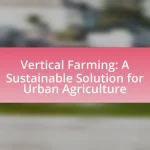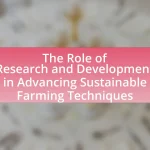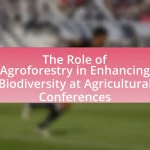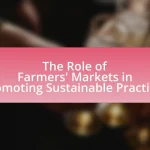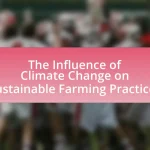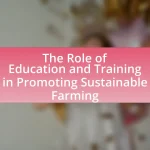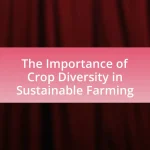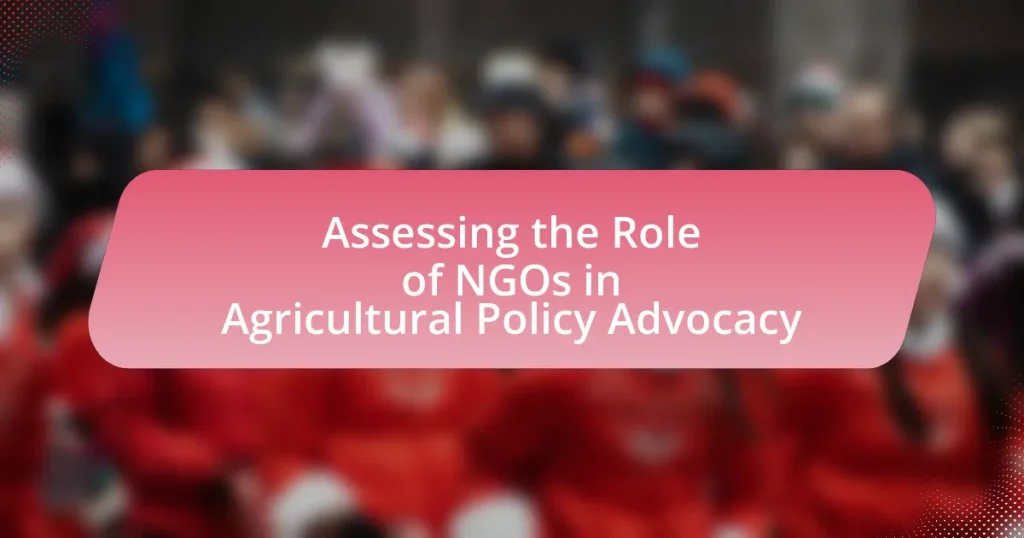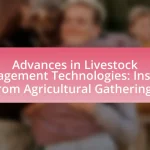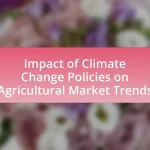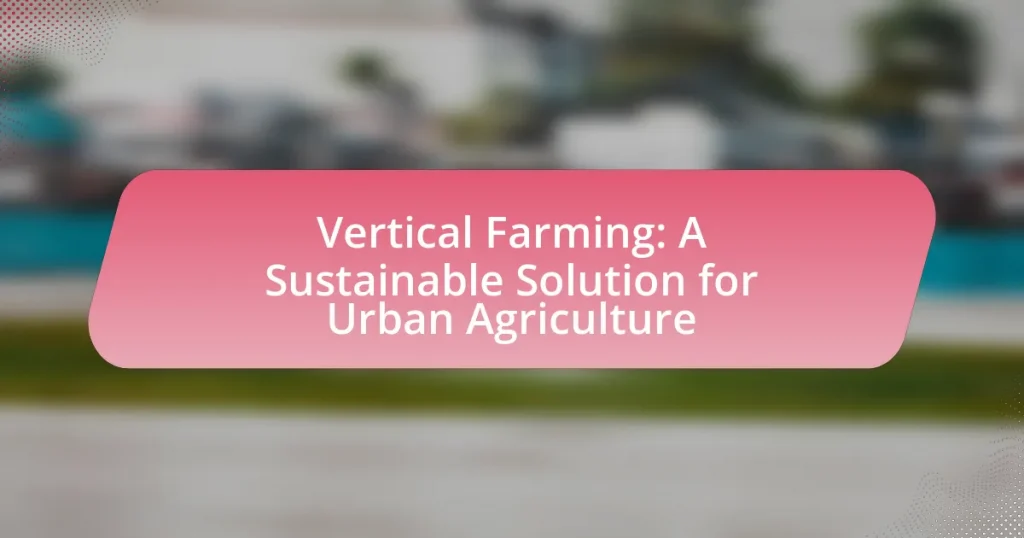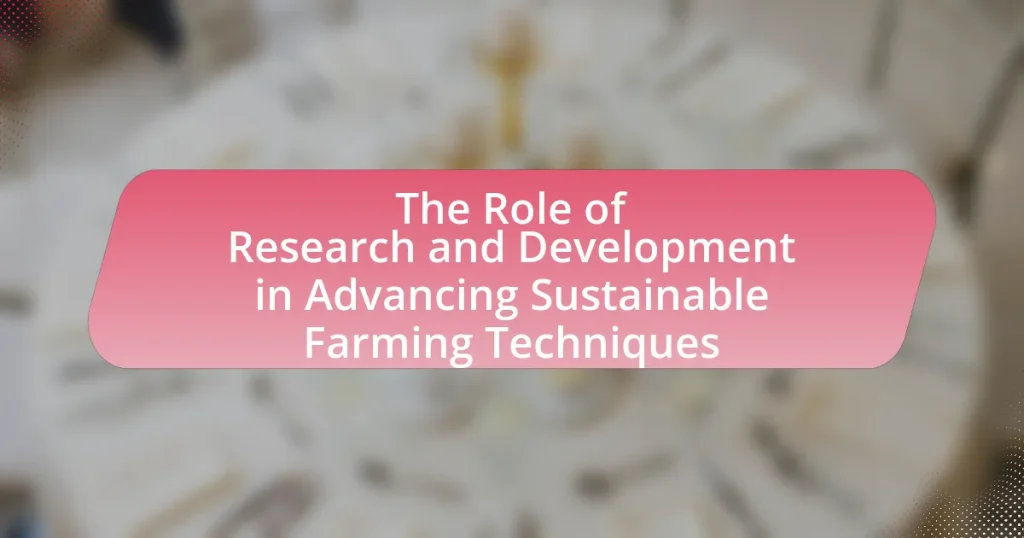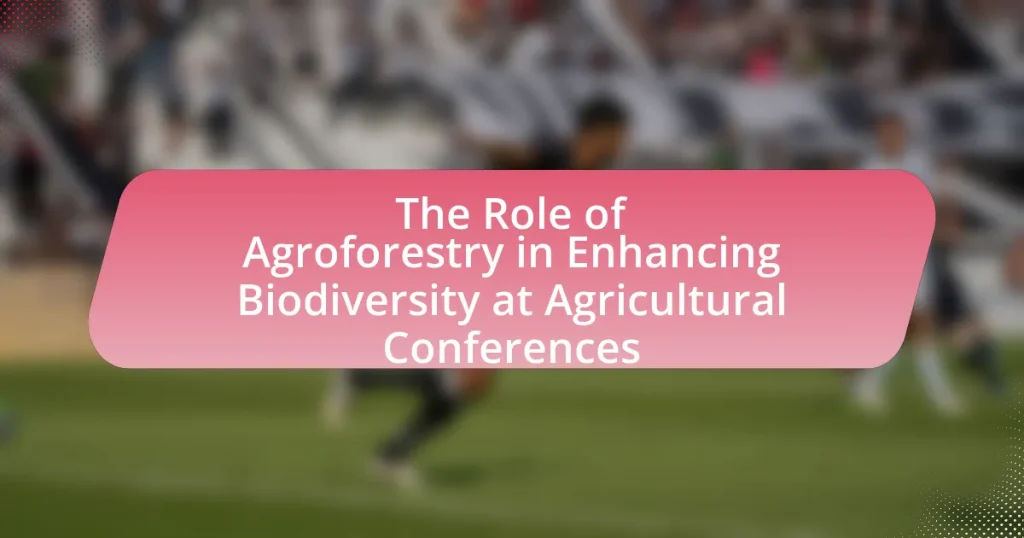The article examines the critical role of non-governmental organizations (NGOs) in agricultural policy advocacy, highlighting their efforts to represent marginalized communities and promote sustainable practices. It discusses how NGOs influence policy decisions through research, grassroots mobilization, and collaboration with various stakeholders, including government entities and local communities. Key strategies employed by NGOs, such as coalition building and public awareness campaigns, are outlined, along with the challenges they face, including funding limitations and political resistance. The article also explores the impact of technology on advocacy efforts and identifies emerging issues in agriculture that NGOs must address to enhance food security and sustainability.
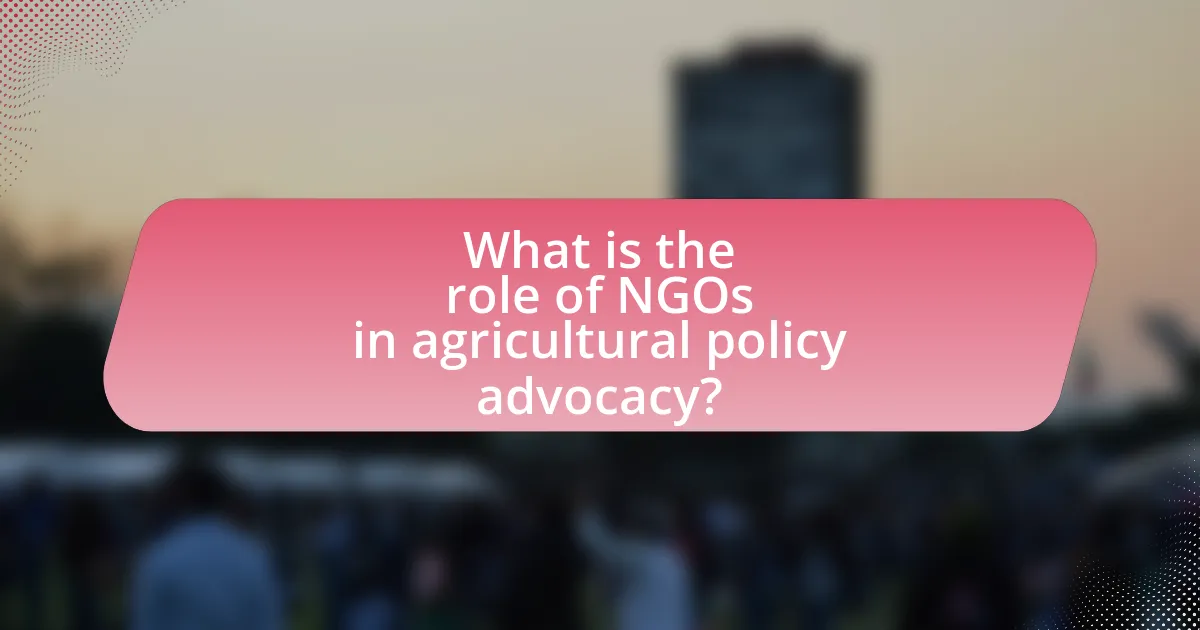
What is the role of NGOs in agricultural policy advocacy?
NGOs play a crucial role in agricultural policy advocacy by representing the interests of marginalized communities and promoting sustainable agricultural practices. They engage in research, provide expert analysis, and mobilize grassroots support to influence policy decisions. For instance, organizations like Oxfam and the World Wildlife Fund have successfully lobbied for policies that support smallholder farmers and environmental sustainability, demonstrating their impact on shaping agricultural policies at national and international levels. Their advocacy efforts often include raising awareness about food security issues and pushing for equitable resource distribution, which is essential for effective agricultural policy development.
How do NGOs influence agricultural policy decisions?
NGOs influence agricultural policy decisions primarily through advocacy, research, and grassroots mobilization. They engage in lobbying efforts to shape policy frameworks by presenting evidence-based research that highlights the needs of farmers and communities. For instance, organizations like Oxfam and the World Wildlife Fund have successfully influenced policies by providing data on sustainable practices and food security, which has led to changes in government regulations and funding priorities. Additionally, NGOs often collaborate with local communities to amplify their voices, ensuring that policy decisions reflect the interests of those directly affected by agricultural practices. This multifaceted approach enables NGOs to play a critical role in shaping agricultural policies that promote sustainability and equity.
What strategies do NGOs employ in advocacy efforts?
NGOs employ various strategies in advocacy efforts, including grassroots mobilization, policy analysis, coalition building, and public awareness campaigns. Grassroots mobilization involves engaging local communities to participate in advocacy initiatives, which enhances legitimacy and amplifies voices. Policy analysis allows NGOs to assess existing agricultural policies and identify gaps, enabling them to propose evidence-based alternatives. Coalition building fosters collaboration among diverse stakeholders, increasing influence and resource sharing. Public awareness campaigns utilize media and communication tools to educate the public and policymakers about agricultural issues, driving change through informed advocacy. These strategies are supported by successful case studies, such as the role of NGOs in the 2015 Paris Agreement, where collaborative advocacy led to significant climate policy advancements.
How do NGOs collaborate with other stakeholders in agriculture?
NGOs collaborate with other stakeholders in agriculture by forming partnerships with government agencies, private sector entities, and local communities to enhance agricultural practices and policies. These collaborations often involve joint initiatives such as capacity building, knowledge sharing, and resource mobilization, which aim to improve food security and sustainable farming methods. For instance, NGOs like Oxfam and the World Wildlife Fund work alongside farmers and agricultural businesses to implement sustainable practices that align with local needs and environmental considerations. This collaborative approach is supported by evidence showing that multi-stakeholder partnerships can lead to more effective agricultural policies and improved outcomes for rural communities, as highlighted in the Food and Agriculture Organization’s reports on stakeholder engagement in agriculture.
Why are NGOs important in shaping agricultural policies?
NGOs are important in shaping agricultural policies because they advocate for the interests of marginalized communities and promote sustainable practices. By conducting research, providing expertise, and mobilizing grassroots support, NGOs influence policy decisions that affect food security, environmental sustainability, and rural development. For instance, organizations like Oxfam and the World Wildlife Fund have successfully lobbied for policies that prioritize smallholder farmers and sustainable agriculture, demonstrating their impact on national and international agricultural frameworks.
What unique perspectives do NGOs bring to agricultural issues?
NGOs bring diverse perspectives to agricultural issues by emphasizing sustainability, social equity, and community engagement. These organizations often advocate for environmentally friendly practices, highlighting the importance of preserving natural resources while meeting food production needs. For instance, NGOs like Oxfam and the World Wildlife Fund focus on promoting agroecological methods that enhance biodiversity and soil health, which are critical for long-term agricultural viability. Additionally, NGOs address social justice by advocating for the rights of marginalized farmers, ensuring that their voices are included in policy discussions. This advocacy is supported by data showing that inclusive agricultural policies can lead to improved food security and economic resilience in communities.
How do NGOs address the needs of marginalized farmers?
NGOs address the needs of marginalized farmers by providing access to resources, training, and advocacy for equitable agricultural policies. They facilitate access to financial services, such as microloans, which enable farmers to invest in their operations. Additionally, NGOs offer training programs that enhance agricultural skills and promote sustainable practices, leading to improved crop yields. For instance, the International Fund for Agricultural Development reported that targeted training can increase productivity by up to 30% among smallholder farmers. Furthermore, NGOs engage in policy advocacy to influence government decisions, ensuring that the voices of marginalized farmers are heard in agricultural policy discussions. This multifaceted approach helps to empower marginalized farmers, improve their livelihoods, and promote food security.
What challenges do NGOs face in agricultural policy advocacy?
NGOs face several challenges in agricultural policy advocacy, including limited funding, political resistance, and lack of access to decision-making processes. Limited funding restricts their ability to conduct comprehensive research and outreach, which is essential for effective advocacy. Political resistance often arises from government entities or powerful agricultural lobbies that may oppose reforms that threaten their interests. Additionally, NGOs frequently encounter barriers to accessing key decision-makers, which hampers their ability to influence policy effectively. These challenges are documented in various studies, such as the “State of Civil Society Report” by CIVICUS, which highlights the constraints faced by civil society organizations in influencing policy.
How do funding limitations impact NGO effectiveness?
Funding limitations significantly reduce NGO effectiveness by constraining their operational capacity and limiting program implementation. When NGOs face financial shortfalls, they often have to cut essential services, reduce staff, or scale back projects, which directly impacts their ability to advocate for agricultural policies effectively. For instance, a study by the International NGO Training and Research Centre found that 70% of NGOs reported decreased program quality due to funding constraints, highlighting the direct correlation between financial resources and operational efficacy. Additionally, limited funding restricts NGOs’ ability to engage in comprehensive research and outreach, which are critical for influencing agricultural policy.
What barriers exist in engaging with government entities?
Barriers in engaging with government entities include bureaucratic red tape, lack of transparency, and limited access to decision-makers. Bureaucratic red tape often results in lengthy processes that hinder timely communication and action. A lack of transparency can create distrust, making it difficult for NGOs to understand government priorities and policies. Additionally, limited access to key decision-makers restricts NGOs’ ability to influence policy effectively. According to a study by the World Bank, these barriers can significantly impede the effectiveness of NGOs in agricultural policy advocacy, highlighting the need for improved communication channels and collaborative frameworks.
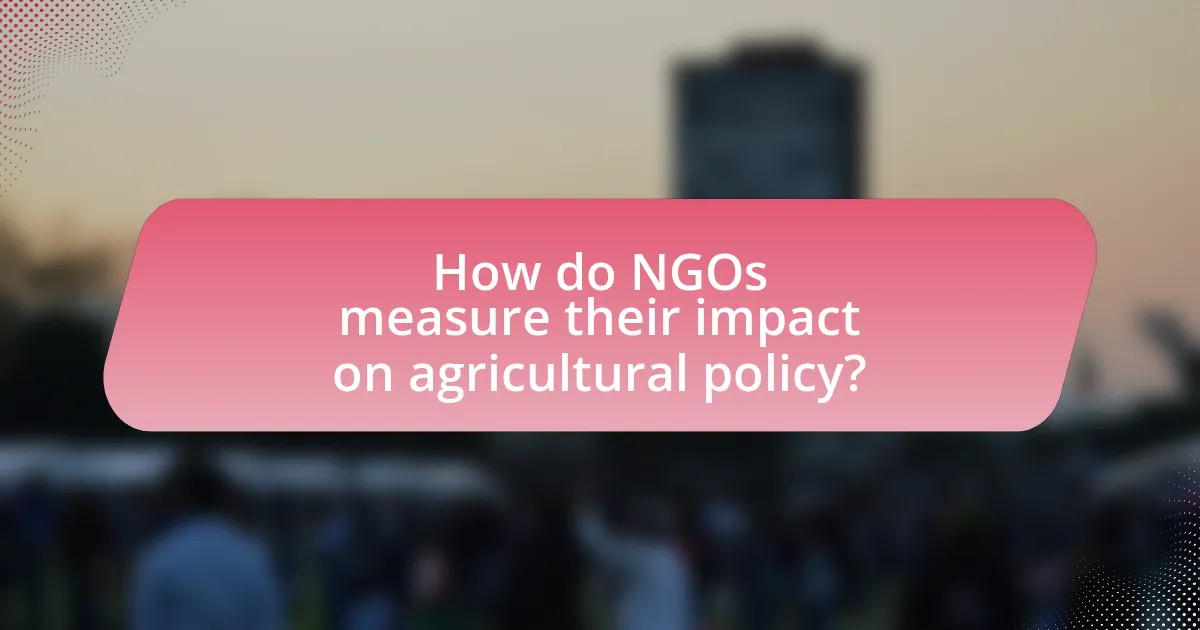
How do NGOs measure their impact on agricultural policy?
NGOs measure their impact on agricultural policy through a combination of quantitative and qualitative assessments. They often utilize indicators such as changes in policy frameworks, the number of stakeholders engaged, and shifts in public awareness regarding agricultural issues. For instance, a study by the International Food Policy Research Institute found that NGOs effectively influenced policy changes in several countries by tracking legislative amendments and documenting case studies of successful advocacy efforts. Additionally, NGOs may conduct surveys and interviews to gather feedback from farmers and policymakers, thereby assessing the real-world implications of their advocacy work.
What metrics are used to assess NGO effectiveness in advocacy?
Metrics used to assess NGO effectiveness in advocacy include policy influence, stakeholder engagement, and measurable outcomes. Policy influence is evaluated by tracking changes in legislation or regulations that align with the NGO’s goals, demonstrating the direct impact of advocacy efforts. Stakeholder engagement metrics assess the level of collaboration and communication with key partners, including government entities and community groups, which can indicate the NGO’s ability to mobilize support. Measurable outcomes involve quantifying the results of advocacy campaigns, such as increased funding for agricultural programs or improved access to resources for farmers, providing concrete evidence of the NGO’s effectiveness in achieving its objectives.
How do NGOs track changes in policy as a result of their efforts?
NGOs track changes in policy as a result of their efforts through systematic monitoring and evaluation processes. They utilize tools such as policy analysis, stakeholder feedback, and impact assessments to measure the effectiveness of their advocacy initiatives. For instance, NGOs often compare pre- and post-advocacy policy documents to identify specific changes, while also gathering qualitative data from affected communities to assess the real-world implications of these policy shifts. This approach is supported by evidence from studies showing that NGOs that implement structured tracking mechanisms can demonstrate a direct correlation between their advocacy efforts and subsequent policy modifications, thereby validating their influence in agricultural policy advocacy.
What case studies illustrate successful NGO interventions?
Successful NGO interventions are illustrated by the case studies of the International Food Policy Research Institute (IFPRI) and Oxfam’s work in Ethiopia. IFPRI’s research and advocacy led to the implementation of the Agricultural Growth Program, which increased agricultural productivity by 25% from 2010 to 2015, benefiting over 1.5 million farmers. Oxfam’s initiatives in Ethiopia focused on improving food security through community-based programs, resulting in a 40% reduction in malnutrition rates among children in targeted areas between 2012 and 2016. These examples demonstrate the effectiveness of NGOs in influencing agricultural policy and improving livelihoods.
How do NGOs adapt their strategies based on evaluation results?
NGOs adapt their strategies based on evaluation results by analyzing performance data to identify strengths and weaknesses in their programs. This process often involves revising objectives, reallocating resources, and implementing new methodologies to enhance effectiveness. For instance, a study by the International NGO Training and Research Centre found that NGOs that regularly incorporate feedback from evaluations are 30% more likely to achieve their intended outcomes. By utilizing evaluation insights, NGOs can ensure their advocacy efforts in agricultural policy are more targeted and impactful.
What role does feedback play in shaping future advocacy efforts?
Feedback is crucial in shaping future advocacy efforts as it provides insights into the effectiveness of strategies and identifies areas for improvement. By analyzing feedback from stakeholders, NGOs can adjust their approaches to better align with community needs and policy objectives. For instance, a study by the International Institute for Environment and Development found that incorporating stakeholder feedback led to a 30% increase in the effectiveness of advocacy campaigns in agricultural policy. This demonstrates that feedback not only enhances the relevance of advocacy efforts but also fosters greater engagement and support from the community.
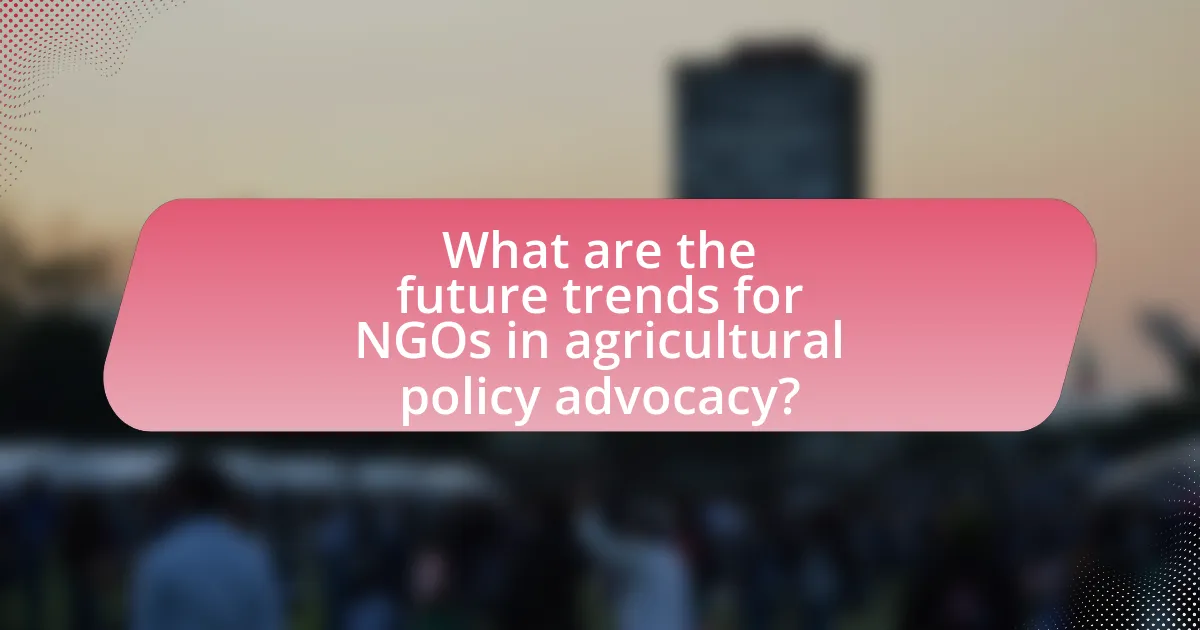
What are the future trends for NGOs in agricultural policy advocacy?
Future trends for NGOs in agricultural policy advocacy include increased collaboration with local communities, a focus on sustainable practices, and the integration of technology for data-driven decision-making. NGOs are likely to prioritize grassroots engagement to ensure that policies reflect the needs of farmers and rural populations, as evidenced by initiatives like the International Fund for Agricultural Development’s community-driven development programs. Additionally, the emphasis on sustainability aligns with global goals such as the United Nations Sustainable Development Goals, which advocate for responsible agricultural practices. The use of technology, such as mobile applications for data collection and analysis, is becoming essential for NGOs to effectively influence policy by providing evidence-based recommendations.
How is technology influencing NGO advocacy in agriculture?
Technology is significantly influencing NGO advocacy in agriculture by enhancing communication, data collection, and outreach capabilities. NGOs utilize digital platforms and social media to disseminate information rapidly, engage stakeholders, and mobilize support for agricultural policies. For instance, the use of mobile applications allows NGOs to gather real-time data on agricultural practices and farmer needs, which can inform policy recommendations. Additionally, technologies such as Geographic Information Systems (GIS) enable NGOs to visualize agricultural trends and advocate for targeted interventions. A study by the Food and Agriculture Organization (FAO) highlights that technology adoption in agriculture can lead to improved productivity and sustainability, thereby strengthening the advocacy efforts of NGOs in promoting effective agricultural policies.
What digital tools are NGOs using to enhance their outreach?
NGOs are using social media platforms, email marketing, and data analytics tools to enhance their outreach. Social media platforms like Facebook, Twitter, and Instagram allow NGOs to engage with a broader audience, share their initiatives, and mobilize support quickly. Email marketing enables targeted communication with supporters and stakeholders, facilitating updates and calls to action. Data analytics tools help NGOs assess the effectiveness of their outreach strategies by analyzing engagement metrics and audience demographics, allowing for more informed decision-making. These tools collectively improve visibility and engagement, essential for effective advocacy in agricultural policy.
How can data analytics improve advocacy strategies?
Data analytics can improve advocacy strategies by enabling organizations to identify trends, measure impact, and tailor messaging effectively. By analyzing data on public sentiment, demographic information, and policy outcomes, NGOs can better understand their target audience and refine their approaches. For instance, a study by the Pew Research Center found that data-driven campaigns can increase engagement by up to 50%, demonstrating the effectiveness of using analytics to inform advocacy efforts. This targeted approach allows NGOs to allocate resources more efficiently and enhance their overall influence in agricultural policy advocacy.
What emerging issues in agriculture will NGOs need to address?
Emerging issues in agriculture that NGOs need to address include climate change adaptation, food security, and sustainable farming practices. Climate change poses significant risks to agricultural productivity, necessitating NGOs to advocate for policies that promote resilience and adaptation strategies among farmers. Food security remains a critical concern, with an estimated 690 million people undernourished globally, highlighting the need for NGOs to support initiatives that enhance access to nutritious food. Additionally, the shift towards sustainable farming practices is essential to mitigate environmental degradation; NGOs must promote agroecological methods and support farmers in transitioning to these practices. These issues are interconnected and require a coordinated response from NGOs to effectively influence agricultural policy and practice.
How are climate change and sustainability shaping NGO agendas?
Climate change and sustainability are significantly shaping NGO agendas by prioritizing environmental advocacy and promoting sustainable practices in agricultural policies. NGOs are increasingly focusing on climate resilience, advocating for policies that support sustainable farming techniques, and addressing the impacts of climate change on food security. For instance, a report by the Food and Agriculture Organization (FAO) highlights that NGOs are instrumental in implementing climate-smart agriculture initiatives, which aim to enhance productivity while reducing greenhouse gas emissions. This shift in focus is driven by the urgent need to mitigate climate impacts and ensure sustainable food systems, reflecting a broader trend where NGOs align their missions with global sustainability goals, such as those outlined in the Paris Agreement.
What role will NGOs play in promoting food security in the future?
NGOs will play a crucial role in promoting food security in the future by advocating for sustainable agricultural practices and influencing policy decisions. These organizations will leverage their expertise to educate communities about food production, nutrition, and resource management, thereby enhancing local food systems. For instance, NGOs like Oxfam and Action Against Hunger have historically engaged in policy advocacy that led to improved agricultural policies, demonstrating their effectiveness in shaping food security initiatives. Their ability to mobilize resources and connect with vulnerable populations will further empower communities to address food insecurity challenges directly.
What best practices can NGOs adopt for effective agricultural advocacy?
NGOs can adopt several best practices for effective agricultural advocacy, including building strong coalitions, utilizing data-driven approaches, and engaging in grassroots mobilization. Strong coalitions enhance influence by uniting diverse stakeholders, which can amplify the advocacy message. For instance, the Food and Agriculture Organization (FAO) emphasizes that collaborative efforts among NGOs can lead to more comprehensive policy recommendations. Utilizing data-driven approaches ensures that advocacy efforts are grounded in evidence, making arguments more persuasive; a study by the International Food Policy Research Institute found that data-backed advocacy can increase policy adoption rates by up to 30%. Grassroots mobilization empowers local communities, fostering ownership and support for agricultural policies, as demonstrated by successful campaigns in various countries that have led to significant policy changes.
How can NGOs build stronger coalitions with other organizations?
NGOs can build stronger coalitions with other organizations by establishing clear communication channels and shared goals. Effective collaboration begins with identifying common objectives that align with the missions of all involved parties, which fosters a sense of unity and purpose. Research indicates that coalitions with defined goals are more likely to achieve significant outcomes; for instance, a study by the National Council of Nonprofits highlights that organizations working together on shared initiatives can leverage resources and expertise, leading to enhanced advocacy efforts. Additionally, regular meetings and collaborative projects can strengthen relationships and trust among coalition members, further solidifying their collective impact in agricultural policy advocacy.
What communication strategies enhance NGO visibility and influence?
Effective communication strategies that enhance NGO visibility and influence include targeted messaging, social media engagement, and strategic partnerships. Targeted messaging ensures that the NGO’s objectives resonate with specific audiences, increasing the likelihood of engagement and support. For instance, NGOs that tailor their messages to align with the interests of policymakers can more effectively advocate for agricultural policy changes. Social media engagement allows NGOs to reach a broader audience quickly, facilitating real-time interaction and mobilization. Research indicates that NGOs utilizing platforms like Twitter and Facebook can significantly increase their visibility; for example, a study by the Pew Research Center found that 69% of adults in the U.S. use social media, providing a vast audience for NGOs. Strategic partnerships with other organizations or stakeholders amplify an NGO’s voice and resources, enhancing credibility and influence in policy discussions. Collaborations can lead to joint campaigns that leverage the strengths of each partner, thereby increasing overall impact.
